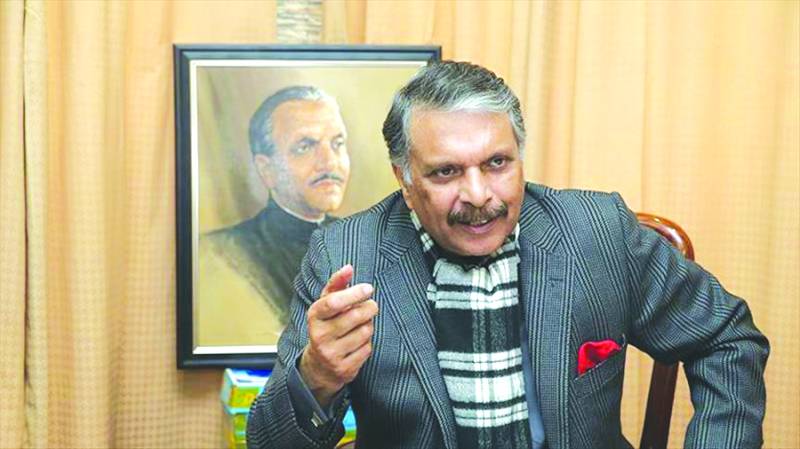ISLAMABAD - Ever since former Pakistani military ruler Gen. Muhammad Ziaulhaq was killed along with several senior military officers and U.S. envoy in a plane crash 32 years ago, conspiracy theories have held mango crates loaded in the plane guilty. However, American and Pakistani investigators over these years have repeatedly concluded that plane crash was an accident, resulting from a technical error. Confirming that there was evidence that mango crates did carry explosives, Muhammad Ijazulhaq, former Pakistani minister and son of Ziaulhaq claimed that nerve gas was also pumped into the cabin to maim pilots. “Conspirators did not want to leave anything to chance. They used nerve gas, explosives and fired a projectile also from outside, “he said.
In an exclusive interview with Anadolu Agency, Ijazulhaq, 67, pointed needle of suspicion to Gen. Aslam Beg, who succeeded his father as army chief and Gen. Mahmud Ali Durrani, then commander of the Multan-based armored division, besides the sleuths of Israeli and Indian intelligence agencies. Assuming the presidency in 1978, Ziaulhaq continued heading the army, till his death. On Aug. 17, 1988, Gen. Ziaulhaq, along with five of his generals and the U.S. Ambassador Arnold Lewis Raphel died, when the C-130 plane crashed near Bahawalpur, 330 miles south of Pakistani capital Islamabad. They had gone to the desert test site to watch a demonstration of the M-1/A battle tanks, which the U.S was pressing Pakistan to buy.
Ijazulhaq, who is writing a book unveiling the coverup and fledgling investigations into the killing of his father said before the explosion pilots had lost control, because of inhaling certain gas in the cockpit. “Bringing down a four-engine plane like C-130 is not an easy task. Conspirators were working at many layers,” he said. Backed by the U.S., Ziaulhaq played a key role in the Soviet-Afghan War, systematically coordinating the Afghan mujahideen throughout the 1980s.
Lamenting at the lack of will exhibited by successive Pakistani governments to conduct a probe into his father’s death, he said that the Americans from the beginning were bent to dismiss crash as an accident. Further, as per their protocol, the FBI is mandated to take up probes within 72 hours, in case of the killing of any American citizen anywhere in the world.
“In this case, where their envoy had died, they took up the case after 11 months, when every trace of evidence was removed from the ground,” he said. President of his faction of Pakistan Muslim League, Ijazulhaq’s party office is in the garrison area of Rawalpindi. While at the entrance of the building a big portrait of his father welcomes the guests, inside walls are decorated with big and small pictures of Gen. Ziaulhaq, either in military uniform or performing duties as president.
Tests prove sabotage theory
The former minister said even those officers who tried to unveil the truth were harassed and transferred. He said that Air Commodore Zaheer Zaidi against all odds took parts of the plane to a laboratory and quietly examined debris and mango peers. “The chemical tests found traces of antimony, phosphorous and other chemicals used in explosives. These tests had proved sabotage theory, “he said. But, the successive governments never showed stamina to probe further and pinpoint the culprits.
Ijazulhaq said that Zaidi had also confirmed the use of nerve gas. The revelation almost confirms the fears of John Gunther Dean, then U.S. ambassador in India, who also believed that VX gas might have been used to kill the Pakistani president and his colleague in Islamabad.
According to information that he had gathered in New Delhi, not many countries possessed the VX gas at that time. Patented by Ranajit Ghosh and J.F. Newman in 1952, the gas attacks a person’s nervous system and prevents their body from functioning properly.
He said even as Zaidi’s account formed part of a Justice Shafi-ur-Rehman Commission report, it was never made public.
Charging Gen. Durrani, for forcing the president to attend the trial of tanks, Ijazulhaq said his father was never interested to attend the function. He said according to the register of the Army House, where his father was living, Durrani had called 16 times to convince his father to fly to Bahawalpur. It is believed that Ziaulhaq was not enthusiastic about procuring these tanks and was much more interested in acquiring AWACS (Airborne Warning and Control System).
Ijazulhaq claimed that even post mortem of the dead bodies was stopped as part of the coverup. “He (Ziaulhaq) never wanted to make this trip. But he was forced to go there. The then Interior Minister Aslam Khattak had even warned him that there is a threat to his life and he should not be traveling,” he said.
Ijazulhaq also revealed that an air force officer Akram Awan arrested three months before the crash for espionage charges had admitted having brought the nerve gas with the help of sleuths of the Israeli spy agency Mossad and India’s external intelligence agency Research and Analysis Wing (RAW). He said the Mossad agent was the U.S. passport holder. Claiming that he also received threats for pursuing investigations into his father’s death, Ijazulhaq even named the U.S. intelligence station chief in Islamabad for suggesting him to concentrate on his political career rather than hunting the truth.
“He (American intelligence man) conveyed to me through my brother, to concentrate on my political career and stop pursuing the case, “he said. The Turkish Anadolu Agency will release a detailed interview of Ijazulhaq soon.






